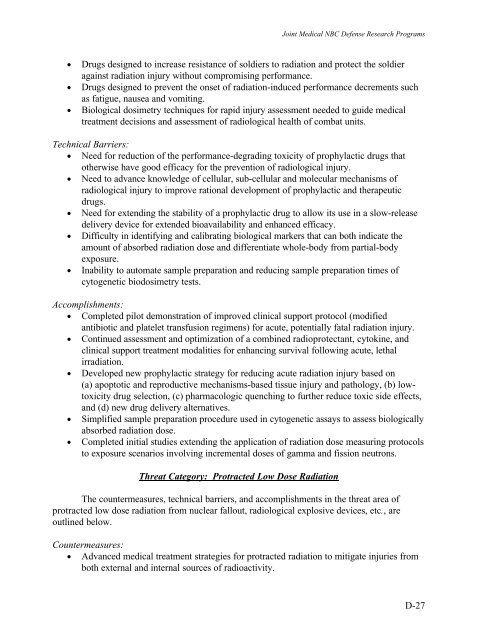Nuclear/Biological/Chemical (NBC) Defense - Federation of ...
Nuclear/Biological/Chemical (NBC) Defense - Federation of ...
Nuclear/Biological/Chemical (NBC) Defense - Federation of ...
Create successful ePaper yourself
Turn your PDF publications into a flip-book with our unique Google optimized e-Paper software.
Joint Medical <strong>NBC</strong> <strong>Defense</strong> Research Programs<br />
• Drugs designed to increase resistance <strong>of</strong> soldiers to radiation and protect the soldier<br />
against radiation injury without compromising performance.<br />
• Drugs designed to prevent the onset <strong>of</strong> radiation-induced performance decrements such<br />
as fatigue, nausea and vomiting.<br />
• <strong>Biological</strong> dosimetry techniques for rapid injury assessment needed to guide medical<br />
treatment decisions and assessment <strong>of</strong> radiological health <strong>of</strong> combat units.<br />
Technical Barriers:<br />
• Need for reduction <strong>of</strong> the performance-degrading toxicity <strong>of</strong> prophylactic drugs that<br />
otherwise have good efficacy for the prevention <strong>of</strong> radiological injury.<br />
• Need to advance knowledge <strong>of</strong> cellular, sub-cellular and molecular mechanisms <strong>of</strong><br />
radiological injury to improve rational development <strong>of</strong> prophylactic and therapeutic<br />
drugs.<br />
• Need for extending the stability <strong>of</strong> a prophylactic drug to allow its use in a slow-release<br />
delivery device for extended bioavailability and enhanced efficacy.<br />
• Difficulty in identifying and calibrating biological markers that can both indicate the<br />
amount <strong>of</strong> absorbed radiation dose and differentiate whole-body from partial-body<br />
exposure.<br />
• Inability to automate sample preparation and reducing sample preparation times <strong>of</strong><br />
cytogenetic biodosimetry tests.<br />
Accomplishments:<br />
• Completed pilot demonstration <strong>of</strong> improved clinical support protocol (modified<br />
antibiotic and platelet transfusion regimens) for acute, potentially fatal radiation injury.<br />
• Continued assessment and optimization <strong>of</strong> a combined radioprotectant, cytokine, and<br />
clinical support treatment modalities for enhancing survival following acute, lethal<br />
irradiation.<br />
• Developed new prophylactic strategy for reducing acute radiation injury based on<br />
(a) apoptotic and reproductive mechanisms-based tissue injury and pathology, (b) lowtoxicity<br />
drug selection, (c) pharmacologic quenching to further reduce toxic side effects,<br />
and (d) new drug delivery alternatives.<br />
• Simplified sample preparation procedure used in cytogenetic assays to assess biologically<br />
absorbed radiation dose.<br />
• Completed initial studies extending the application <strong>of</strong> radiation dose measuring protocols<br />
to exposure scenarios involving incremental doses <strong>of</strong> gamma and fission neutrons.<br />
Threat Category: Protracted Low Dose Radiation<br />
The countermeasures, technical barriers, and accomplishments in the threat area <strong>of</strong><br />
protracted low dose radiation from nuclear fallout, radiological explosive devices, etc., are<br />
outlined below.<br />
Countermeasures:<br />
• Advanced medical treatment strategies for protracted radiation to mitigate injuries from<br />
both external and internal sources <strong>of</strong> radioactivity.<br />
D-27
















